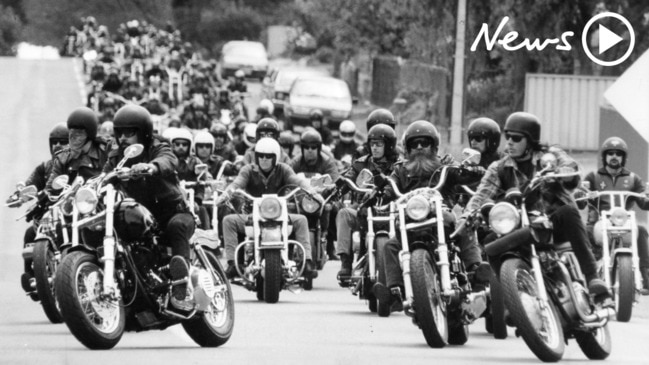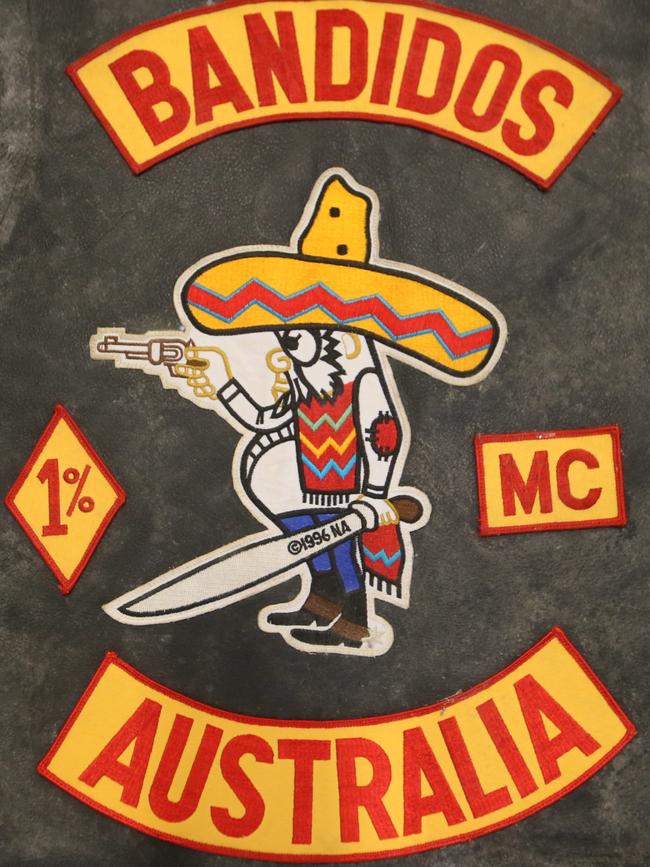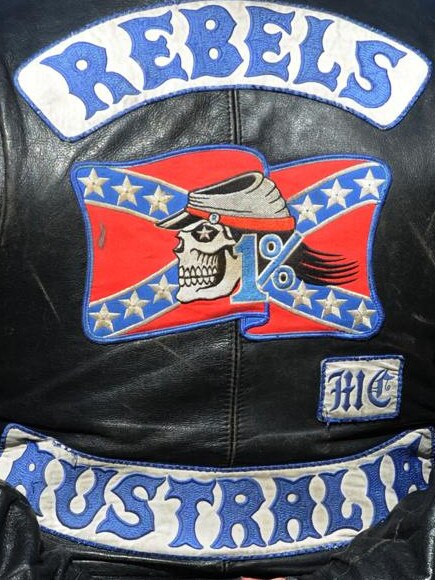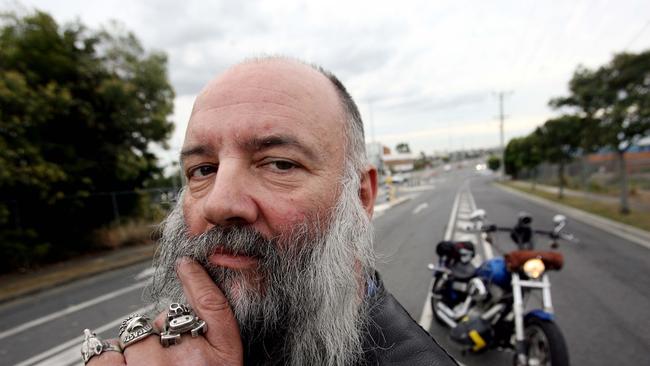Bikies tell how they were lured to join growing ranks of outlaw motorcycle gangs
They are the one-percenters, the hardcore bikie outlaws striking terror as they roll across the country. But what drives them to sign up to a motorcycle gang? Insider detail reveals why many joined, and some of the tactics used to recruit members.

VIC News
Don't miss out on the headlines from VIC News. Followed categories will be added to My News.
They are the one-percenters, the hardcore outlaws striking terror in the suburbs as they roll across the country with apparently no-one to stop them.
These insiders have revealed what drove them to the bikie lifestyle, and how some new members are convinced to sign up.
HOW POLICE CRACKED SECRET BIKIE CODE
HOW POWER VACUUM WEAKENED REBELS EMPIRE
THE BRUTAL HISTORY OF BANDIDOS
Steve Utah made his first bomb at the age of eight in the backyard of his Frankston home.
That same year he cut off the head of his brother’s pet mouse as retribution for a schoolyard fight.
His first run-in with police came at the age of 10 after he assaulted a boy he believed had sexually molested his friend’s sister.
By 15, he was packed off to Turana Youth Training Centre in Parkville.
Not surprisingly, by his late 20s he was cooking drugs and arranging security for the Bandidos motorcycle club in the mid-1990s.
“His initial involvement with the gang wasn’t an uncommon story,” says former policeman Duncan McNab, the co-author of a book about Utah called Dead Man Running.
“Lousy childhood, minor crimes, first girlfriend was Roberta who later married Carl Williams, and time in a boys’ home.”

But Utah delayed his inevitable pathway to crime by joining the Australian Army, and it was the skills he developed here as a munitions technician that helped him become a trusted confidante of the Bandidos.
“He was also a very skilled chemist, which means you have the capacity to safely make the amphetamine products, which is the driving force of the bikie gangs’ business,” McNab says.
McNab, who also wrote Outlaw Bikers in Australia, says the booming drug trade has changed the nature of bikie gangs.
He says Utah’s recruitment is an example of how outlaw motorcycle gangs have become skills-based rather than passion-based.
“While there are still lots of blokes who are attracted by that brotherhood, by that notion of being a group of men standing outside society and having a thoroughly good time, drugs have changed all that,” McNab says.

Utah now lives in exile overseas after turning informer and lifting the lid on alleged club violence, including claiming in Dead Man Running that the Bandidos killed Geelong father-of-four Earl Mooring in 2000.
He also detailed Mr Mooring’s grisly demise in a TV interview.
Utah claimed two Bandidos tried to extract $160,000 from Mr Mooring by torturing him with a hammer for hours before he was killed.
Utah was charged with the murder in 2004 but the charge was later dropped.

A coroner found remains located in NSW were those of Mr Mooring, but was unable to find anyone responsible.
In 2013, in an interview with New Corp, he spilt the beans on the culture of bikies and the rise of gang wars.
He said he was living in exile because of police, political and systemic failure in helping those wishing to do the right thing and educating authorities on the inner workings of the outlaw motorcycle gang network.
POLICE SMASHED BRUTAL COMANCHERO GANG
He lives every day in the knowledge that if he is discovered by the Bandidos, a club whose tentacles spread around the world, it will be his last.
Australian Crime Commission statistics show there are more than 40 outlaw motorcycle gangs operating in Australia.
The ACC estimates that there are 6000 “patched” members who make up the 1 per cent of bikies who operate outside the law.


McNab says the largest club is the Rebels, which has been about since the late 1960s and has about 2500 members.
“One of the weird things about bike gangs, which has always struck me as odd, is in the year after the Milperra Massacre in 1984 (firearm battle between Comanchero and former members that had formed the Bandidos Motorcycle Club) the enthusiasm to join bikie gangs spiked; they were queuing at doors to get in,” he says.


McNab says bikie clubs provide a structure of trust, brotherhood and loyalty, and are run like quasi-military operations.
Members don’t even need bikes anymore as the “one percenters” fight among themselves for a bigger share of Australia’s drug trade, as well as interests in security, tattoo, brothel, car wash and debt collection businesses.
Melbourne youth crusader Les Twentyman is seeing the bottom-feeder recruitment.
“A bikie gang were pressuring this kid. What they did was feed him some methamphetamine and he thought he was getting it for nothing, that people were just looking after him. And when he had a substantial debt, they then turned to him and said, ‘Where is the money?”

“He said, ‘I haven’t got a job.’ (They said:) ‘OK, you’re going to have to start dealing.’
“So he gets hooked in because he has a major methamphetamine debt. This is another way these kids are being recruited.”
INSIDE MELBOURNE’S OUTLAW BIKIE GANGS
Twentyman says young people are gravitating towards gangs because of homelessness, family breakdown and “massive youth unemployment’’.
“That’s why these bikie gangs have become so popular because, if you are disconnected and can’t find a job, you’re going to be protected because you’re in this group and they are going to watch your back.”
Police have launched crackdowns on Melbourne’s bikies and underworld figures over the years: raiding the Mongols’ clubhouse and seizing weapons, intercepting an alleged Red Devils Motorcycle Club drug deal outside Crown Casino, and banning dozens of bikies and associates from Crown casino and the state’s racetracks.

But former Outcasts member Russell “Camel” Wattie is determined to counteract the disturbing picture of rampant crime and violence that prompted Queensland’s controversial anti-association laws.
“In the past five to six years there has been a strong propaganda campaign against bike clubs, patch clubs,” Wattie says.
He likens the average outlaw motorcycle clubhouse to a “men’s shed”, a place to grab a spanner and have a tinker on a bike, or hang out with like-minded people and watch the footy on a Friday night.
“Certainly the clubs that I was involved in, there was absolutely no requirement to commit any crime,” says Wattie, an independent lobbyist for bikies.
“I have a criminal record, but there were guys in the club that were ex-military. We had one guy join when he was 67. He’d retired, he was an electrician and he had become a nuisance to his family because he was home all the time. They said go and get yourself a bloody hobby, but they didn’t expect him join a bike club.”

Wattie says he joined the Outlaws and still rides with clubs because members know how to ride in tight formations.
“You know nothing is going to go amiss,” he says
He believes motorcycle clubs — outlaw or otherwise — provide the structure to help men change their lives for the better.
“The club doesn’t turn you into a smarter criminal. What it does is it gives you a focus that actually away from that criminal side of your life, where you can be yourself without judgment,’ he says.
He also downplays the violence.
“In 20 years of drinking in clubhouses I’ve seen two blokes get hit and in both cases they absolutely, thoroughly deserved it,” he says.
But there is plenty of evidence that if members break club rules, they cop a violent bashing, and lose their bike and anything associated with the club.
In 2009, the Herald Sun reported that Christopher Wayne Hudson, who is serving 35 years for killing lawyer Brendan Keilar and shooting Dutch backpacker Paul de Waard in June, 2007, was punished for bringing shame on the Hells Angels.

Senior members reportedly chained him up and used a blowtorch to remove a Hells Angels tattoo from his arm.
Researcher Mark Lauchs says there hasn’t been any rigorous academic, psychological work on why men join outlaw motorcycle gangs.
“From the autobiographical material and the other material that’s popped up, the conclusion is that people become bikies because they like it. They are attracted to the lifestyle. Pure and simple,” says Lauchs, a senior lecturer at the Queensland University of Technology’s School of Justice.
“Similar research has been found about some people who participate in terrorist groups. They love the lifestyle.”
He says it’s ultimately about masculinity and mateship.

“It sounds very touchy-feely and it is on a psychological level. They are very violent, quite aggressive individuals. It’s a type of blokiness, but you know that you have absolute certainty that the other members of this group will support you,” Lauchs says.
“And that’s pretty rare. The only other group that I know that have that kind of guarantee is the police.
“Their profiles are exactly the same. It’s just that one has legal support and a justice focus and the other has an outcast focus. Otherwise it’s about masculinity, brotherhood and support.”


